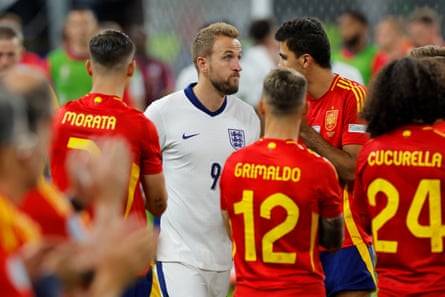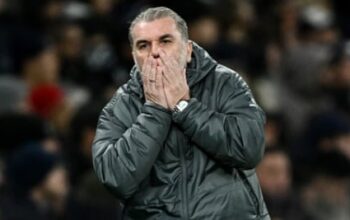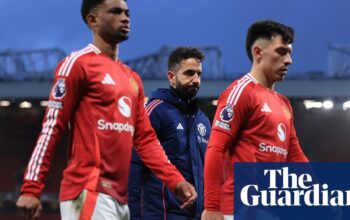Well, that’s probably a relief in the end isn’t it? As England gear up for the thrillingly room‑temperature double header against Greece and Finland it is hard to feel much disappointment at the news Harry Kane is likely to play, at best, a very minor role. All the better to rest his aching ankle, tortured back and whirring brain, the ligaments that creak and crack like a ship’s rigging, at least until the slog of club football resumes next week.
It has, after all, been 13 years, with 650 professional games and five hugely gruelling England tournaments. Through this Kane’s management of the biting point of his own body has been a constant sub‑narrative, to the extent there is now something unbearably tender about watching those joints and levers gamely firing up once again.
The current leg issue is Kane’s 12th major injury since the beginning of 2019. He always comes back quickly, and often shows it. When he finally does shuffle off, Kane’s body should probably be retained on display in the National Football Museum, preserved like a dusty Victorian albatross, a monument to exploring the far limits of your own talent and physique.
It is probably just that feeling of strain, plus the understandable desire to see new things, that explains why his absence for these games feels like a blessing. Kane remains England’s most successful modern player. He has gone all in with this, has loved it, has pegged his sporting existence around the England identity, to the extent it feels like an indissoluble bond. Kane is basically England’s dad in the modern era.
But do we really want to see the old patterns right now: the same shapes and movements, the standard goal in each game (a penalty, a ping into the corner), the Kane iconography of the past eight years? With this in mind, here is a thought. Whisper it. Say it out loud. Whatever. It’s not actually going to happen. But there is a fair case that both Kane and England would be better off if he retired from international football.
This is not on the cards. Longevity is the aim. The talk is 150 caps, 100 goals, an endless Kane supremacy. Maybe that’s fine. Maybe the national team are more likely to win something if he does this. But it is always a little later than you think. And while stepping aside might seem an odd suggestion, it’s really not given the longer history of England footballers in the same role, given Kane’s point on his own timeline, and what can be realistically achieved from here. No one has suggested this. Perhaps they should.

It is worth considering this from two perspectives; player and team. What does Kane really want to do from here with England? What is the endgame? Presumably the answer is, trying to win a home Euros with England in 2028. But Kane will be 35 in the month that tournament ends. This same Kane whose career is already about fighting his body, managing what is left, catering to physical decline. Can you imagine the sheer agony of watching this still going on four years from now, the accumulated scar tissue of Kane the late-career super sub?
Before that we have a World Cup in two years’ time. This is more plausible. But actually winning a World Cup, the only way Kane can really top what he has already done, is also an absolute moonshot. A younger, fresher Kane has already had a shot in two England finals. Are there really new peaks to scale here?
For now there is at least a completeness to Kane’s England career: 68 goals in 100 games, more in tournaments and knockout games than anyone else, a key role in a generational revival. It seems absurd that Kane should need defending, but England is sometimes absurd, and it is always worth remembering Kane wasn’t really meant to be this good, wasn’t a prodigy, failed to get in at Spurs as a kid, came back as a midfielder, filler not a star. And while it is an enduring joke to see Kane as the highest-scoring person who doesn’t win – World Cup golden boot, Euros golden boot, highest-scoring Englishman in the Champions League and Bundesliga, but yes, zero trophies – the fact is he makes teams better.
Sadly those teams have turned out to be Spurs and England, two entities already defined by not winning anything, and then a Bayern Munich so bad they were willing to pay £100m for Kane despite his decision to stay on too long at Spurs, so desperate that their manager is now Vincent Kompany. This isn’t a curse. It’s a battle against circumstance and your own bad timing.
after newsletter promotion
Surely it would be beneficial to concentrate instead on what is achievable, on managing his time in club football better, seeking to actually win some pots, to round out his experience, to adopt the path of senior star player at one of Europe’s elite clubs. This feels like a workable second life, as opposed to more of the same. As for England, perhaps it might be useful to open up a space in attack, to make a choice about how to play. Kane is still England’s best goalscorer. There is no No 9 at his level, for all the chat about golden gushing spumes of world beating talent.
What England do have is an opportunity to decide how they want to play: with the same semi-mobile superstar, or with different patterns. Ollie Watkins, for example, might never score as many goals or make as many deep passes, but has a very different range of gifts and movement. Watkins has only once played 90 minutes for England. Dominic Solanke is 27 and has one cap. Both are good forwards in their peak years. They can be assets, can change the overall tone. The same goes for the idea of playing a false nine, or for letting Jude Bellingham unleash his Big Jude Bellingham energy in that central attacking role. But all these options need time, and need it now.
In the end everyone worth agonising over stays on too long. By the start of next year Kane will already be older than anyone who scored 30 England goals at the point where they got their last (with the slight exception of Bobby Charlton, who trotted to a standstill). He is already three years older than Michael Owen and Jimmy Greaves when they last scored, and two years older than Alan Shearer.
Accepting your limits is not what star athletes generally do, if only because you don’t get to be a star in the first place if that’s your tendency. There must always be rage against every obstacle, including the dimming of the light. A Kane retirement won’t happen. It doesn’t fit anyone’s plans. It’s not what happens in England, where star players have so much power. But time, which has no respect for your hopes and feelings, might still end up suggesting it was the right thing to do.
Source: theguardian.com


